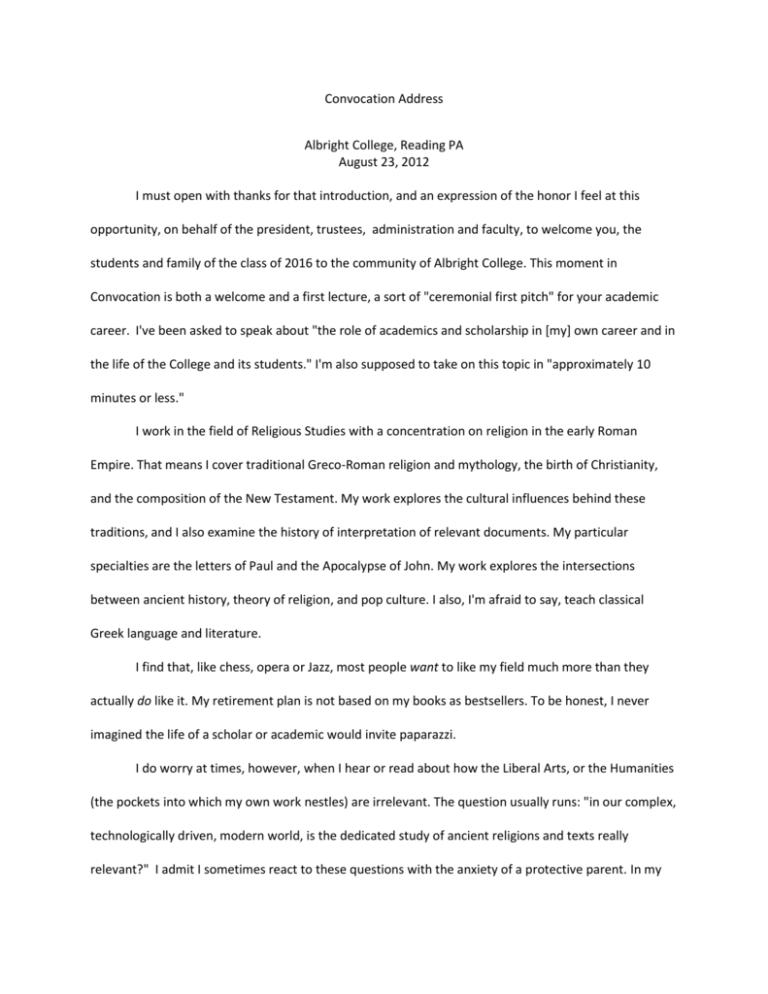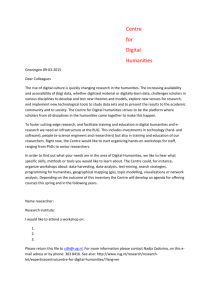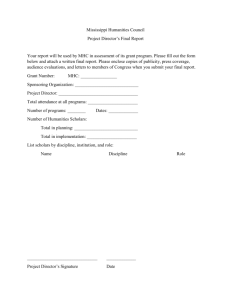Convocation Address Script
advertisement

Convocation Address Albright College, Reading PA August 23, 2012 I must open with thanks for that introduction, and an expression of the honor I feel at this opportunity, on behalf of the president, trustees, administration and faculty, to welcome you, the students and family of the class of 2016 to the community of Albright College. This moment in Convocation is both a welcome and a first lecture, a sort of "ceremonial first pitch" for your academic career. I've been asked to speak about "the role of academics and scholarship in [my] own career and in the life of the College and its students." I'm also supposed to take on this topic in "approximately 10 minutes or less." I work in the field of Religious Studies with a concentration on religion in the early Roman Empire. That means I cover traditional Greco-Roman religion and mythology, the birth of Christianity, and the composition of the New Testament. My work explores the cultural influences behind these traditions, and I also examine the history of interpretation of relevant documents. My particular specialties are the letters of Paul and the Apocalypse of John. My work explores the intersections between ancient history, theory of religion, and pop culture. I also, I'm afraid to say, teach classical Greek language and literature. I find that, like chess, opera or Jazz, most people want to like my field much more than they actually do like it. My retirement plan is not based on my books as bestsellers. To be honest, I never imagined the life of a scholar or academic would invite paparazzi. I do worry at times, however, when I hear or read about how the Liberal Arts, or the Humanities (the pockets into which my own work nestles) are irrelevant. The question usually runs: "in our complex, technologically driven, modern world, is the dedicated study of ancient religions and texts really relevant?" I admit I sometimes react to these questions with the anxiety of a protective parent. In my better moments, however, I hear in the question posed to the Humanities a fundamentally fair inquiry: this process of education takes away years of vigorous life, costs tens of thousands of dollars, and requires a deep commitment. Is it worth it? For you, the students, today is a day of transition but also of questions. As a biblical scholar, I could quote Jesus' parable about the importance of "counting the costs" of any new endeavor, and as a scholar of the sociology of Religion, I would observe that, as humans often do, we mark such transitions with a ritual: this Convocation is for both. This assembly will not convene again, quite like this, until graduation. What will matter from those intervening four years? While you, as students, are understandably pensive and curious, we, the faculty, often are awash in memory. Today, my memory strays to another Fall, ten years ago. In late August of 2001 I was pensive and curious. I was a late-stage Ph.D. candidate at Drew University in Madison, New Jersey. I had been hired by that College to teach a course for the Fall, and I marched in my first convocation as a faculty member. The course was for intermediate and advanced students of ancient Greek; we were honing their skills by reading various texts. I need not remind you what was to happen in a few short weeks. The trauma of September the 11th is still acute. For most of us, the events of that day and those following it are both vivid and a blur. Madison, NJ is a quiet exurb of Manhattan, about 30 miles due west of downtown. From the nearby hills, we could see the smoke rising. Many of our neighbors in the community worked in the city. Armed soldiers patrolled train stations and government buildings, and military aircraft flew overhead. The number and names of the dead were still being compiled. In the midst of such confusion, on the 13th, courses resumed, frankly more out of a desire to cling to something "normal." For my 9:00 am Greek class, surprisingly, everyone was present. I took my chair at the conference table and began to take out my things. No one spoke. I thought "someone should say something" before I realized that "someone" was probably me. I tried by focus on our text for that day. We were reading Gorgias, a dialog by Plato, the most important philosopher from Classical Athens. In the text, the philosopher Socrates, Plato's teacher, has a discussion with a man named Gorgias. The two end up debating the meaning of piety and ethics, particularly in the context of religion. The fundamental question they arrive upon is: is something "good" because the gods command it, or is there some, eternal, natural sense of "good" which humans and even the gods must acknowledge. Mercifully, a student raised her hand. "Professor, I'm not prepared to read today. None of us are." "Of course you're not." I answered. "I'm not either." "I can't help wondering" she asked "why we're even in here." We talked, all of us, for about an hour. We shared stories, fears, ideas. Eventually, I said "I think we should try to read today and do the best we can, together." This is why I teach. I discovered the most important idea I've ever had for understanding my field and my work in an answer to a student's question. What I found, in that classroom, was an idea germinating from seeds deeply planted within me by my own teachers to flower finally in our conversation. I reminded the students that the document we were reading was the memory of a discussion about morality and ethics that had occurred during one of the most traumatic civil wars in ancient Greece, the Peloponnesian conflict. It had been written down by Plato in decades rife with political and economic uncertainty. The language in which it was written was now dead; it was a language only learned in classrooms, never cradles. This book simply shouldn't exist. For almost 2500 years, this text had been copied and studied by generations of scholars. In those millennia, Western history had experienced countless tragedies, invasions, wars, plagues, and traumas. This document sat on the table in front of us on September 13, 2001 because hundreds of generations of scholars had done the largely anonymous, quiet work of its preservation and translation. This text, suddenly so relevant, existed only because, for almost 2500 years, despite astonishing losses and grief and fears, generations of scholars remained determined that memory of its words would not cease. And Gorigias was not alone. A host of other texts – not least of which were both the Koran and the Bible – arose in response to collective trauma and had, in turn, been passed on despite other traumas. These writings existed only because generations of scholars had refused to let them not exist. And we (here I found my own voice) have refused because these texts, despite their limitations, often contain the best of our collective ideals. For almost 2500 years, the knowledge of how to read this document had not passed from the Earth, and I was determined that, if nothing else could be done on that September morning, that knowledge would not end today. This text had survived, it existed, and it would continue. We could, collectively, at least ensure that. This, to me, has become the essence of both scholarship and ritual, the two phenomenon woven together today. Ritual – even secular ritual –reminds us we are a part of a story larger than our own unique life. It gives us comfort and compels us to act. We are reminded that others have traveled this road, survived, and passed something on; we shall, as well. Ritual reminds us of our obligations to the generations past and to those yet to come. The same is true of scholarship. Scholarship in the Humanities, is, fundamentally, the impartation of collective wisdom with the goal of the construction of individual character. My work is to speak with and for the dead, to learn their language(s), to marvel at their art, to correct their myopia even as I am humbled by their depth of vision. I prospect through their thoughts sifting out those which are relevant to my own context; I am inspired by their words to speak and act in my own community; I pass on these gifts for later students. This, to me, is what sets education – a word in Latin meaning "building up," "rearing," "bringing to fulfillment" – apart from simple training in practical skill or technique. Education creates "vocation," a sense of "calling" and mission, not just occupation. The educated person is trained to spend whatever gifts and leisure she might have on the building up our community and herself for service, not simply to gratify appetite or escape responsibility. She is trained for vocation, not simply work. For millennia scholars in my field have argued that the formation of character must accompany training in technique. We need a world filled with highly skilled individuals in economics, commerce, law, agriculture, chemistry, biology, physics, medicine, politics, sociology, psychology, education, technology and more. The fundamental obligation of the educated person is to action, and action requires training. Yet we also need all these individuals trained in ways that acknowledge the collected human wisdom found in the Humanities and Arts. We need this not just because such training imparts creativity, makes us happier, and enhances communication. We need it in order to embed ourselves in the fundamental experience of the continuity of being human. Socrates, Plato, Jesus of Nazareth, the apostles Paul and John, and more, all agreed that to train someone in public skills – politics, commerce, science, technology – without attending to training their character was immoral. It unleashes monsters. To study the Humanities without action is narcissism, but to learn public skills without the wisdom of the Humanities unleashes horror. Time and again human tragedy and trauma – such as 9/11 and its aftermath – occur precisely because of multiple, systemic failures to be humane enough. The Humanities and scholarship are not irrelevant in our modern world; they have not been nearly relevant enough. Today, then, is a ritual where you are being welcomed into a community of scholarship. The immediate community is, of course, our campus, with all its traditions, customs and pleasures. But we are more: This is a transit place, an outpost, where the accumulated knowledge and wisdom of generations is unpacked and passed on to you, so you will be able, in time, to pass this on to others. It is a proving ground for the formation of character and a place of training for vocation, not just work. We invite you into this community, and our hope is that you will drink deeply and become people equipped and determined to give something of yourself that is steeped in ethics and devoted to the dead and the yet-to-be-born. Welcome.







